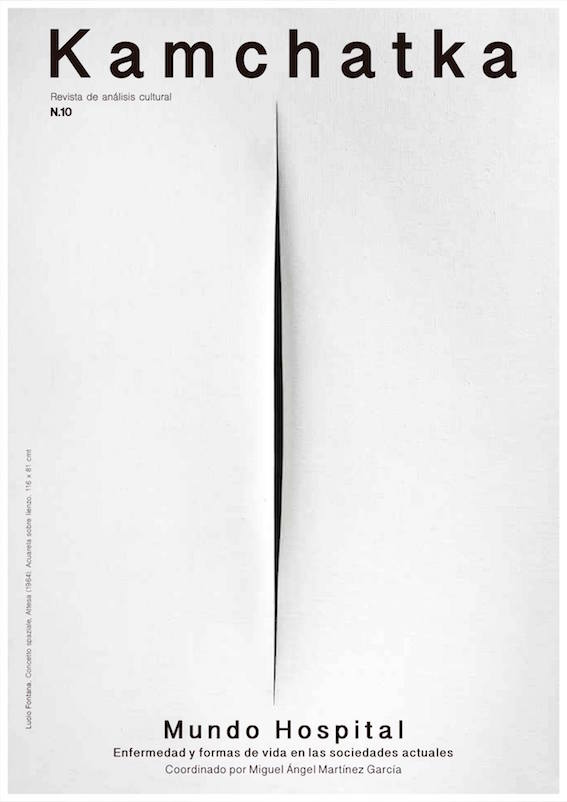Vademecum poético. Devenires más allá de la medicalización en oncogrrrls / Poetic Vademecum. Becomings beyond medicalization in oncogrrrls
DOI:
https://doi.org/10.7203/KAM.10.10643Keywords:
cáncer, activismo, performance, Práctica como Investigación, PaR (Practice As Research) Abstract
Abstract
Resumen: oncogrrls es un proyecto de creación artística, activación política y generación de conocimientos situados en torno a la experiencia oncológica junto a mujeres y disidentes de género. En el marco del laboratorio oncogrrrls llevado a cabo en Diciembre de 2016 en varias ciudades del Estado Español y en respuesta a las experiencias de aislamiento y desactivación afectiva/política/erótica, nos planteamos la pregunta: ¿Cómo podemos devenir más allá de la medicalización? Esta investigación, tomando el método PaR (practice as research) propio de los Estudios de Performance, usa pautas performativas como método y ofrenda. Estas pautas devienen invitaciones a erotizar, suavizar, enmarañar y ritualizar, así como a co-componer un vademécum poético; prácticas de ensayo para generar un onco-cuerpo múltiple, situado y relacional.
Palabras clave: Cáncer, Performance, Práctica como Investigación, Ensayo, Activismo, Feminismo, Pautar, Erótica, Ritual.
Abstract: oncogrrrls is an artistic, activist and situated knowledge-making project with women and queer individuals about the oncological experience. In the context of the laboratory-rehearsal held in several cities across Spain on December 2016, and in response to oncological experiences of isolation and affective/politic/erotic deactivation, we inquired: How can we become beyond medicalization? This research, grounded on the Performance Studies method PaR (Practice as Research), uses performative scores as method and offer. These scores become invitations to eroticize, soften, entangle and ritualize, as well as to co-compose a poetic vademecum; rehearsal practices to enact a situated, multiple and relational onco-body.
Keywords: Cancer, Performance, Practice as Research, Rehearsal, Feminism, Activism, Scoring, Erotic, Ritual
 Downloads
Downloads
 References
References
Bueno, José M. (2017). Buchman, Sabeth y Lafer, Ilse y Ruhm, Constanze (eds.). Putting rehearsal to the Test. Berlin: Sternberg Press: 110-119.
Conquergood, Dwight. “Performance studies: Interventions and radical research”. TDR/The Drama Review 46 (2002): 145-156.
Deleuze, Gilles y Guattari, Felix (1987). A thousand Plateaus: Capitalism and Schizophrenia. Minessota: University of Minessota Press.
Deleuze, Gilles y Guattari, Felix (2014). What is philosophy?. New York: Columbia University Press.
Dumit, Joseph. “Writing the implosión: Teaching the world one thing at a time”. Cultural Anthropology 29 (2014): 344-362.
Dumit, Joseph and O’Connor, Kevin (2017). “A Practice as Research Investigation”. Hunter, Lynette (ed.). Sentient Performativiies of Embodiment: Thinking alongside the Human
Ehrenreich, Barbara. “Welcome to cancerland: A mammogram leads to a cult of pink kitsch”. Harper’s Magazine (2001).
Harraway, Donna. “Situated Knowledges: The science question in feminism and the privilege of partial perspectiver”. Feminist studies 14 (1988): 575-599.
Hunter, Lynette (1999). Critiques of Knowing: Situated Textualities in Science, Computing and the Arts. London: Routledge.
Hunter, Lynette (2014). Disunified aesthetics: Situated textuality, performativity, collaboration. MQUP: McGill-Queens Press.
Hunter, Lynette. “Ethics, performativity and gender: porous and expansive concepts of selving in the performance work of Gretchen Jude and of Nicole Peisl”. Palgrave communications 2 (2016). DOI: https://dx.doi.org/10.1057/palcomms.2016.6
Jain, S. Lochlann (2013). Malignant. How Cancer Becomes Us. Berkeley: University of California Press. DOI: 10.1057/palcomms.2016.6
Kiyomiya, Ken-ichi, Saburou, Matsuo, and Masaru Kurebe. “Mechanism of Specific Nuclear Transport of Adriamycin”. Cancer research 61 (2001): 2467-2471.
Lewis, William and Tulk, Niki. “Editorial: Why Performance as Research?”. PARtake: The Journal of Performance as Research 1 (2016).
Lorde, Audre (1980. The cancer journals. San Francisco: Spinster, Aunt Lute.
Lopez-Carrillo, Margarita. “La medicalización de la vida y la salud de las mujeres”. Xarxa de Salut (2016).
Manning, Erin. “Micropolitics: exploring Ethico-Aesthetics”. Inflexions 3 (2009).
Mol, AnneMarie (2002). The Body Multiple. Ontology in Medical Practice Durham-London: Duke University Press.
Novella-O’Connor. “I bet my nipple to grow: A Practice As Research Investigation of Onco-Bodying relations”. TDR/Drama Review (on revision).
Novella, Carolina y Paituví, Marissa (2015). “oncogrrrls: la dansa com a espai polític de creació de narratives pròpies del cáncer de pit”. Porroche-Escudero, Ana, Coll-Planas, Gerard y Riba, Caterina (eds.). Cicatrius (in)visibles. Perspectives Feministes sobre el Càncer de Mama. Bellaterra: Eumo Editorial: 199-210.
Novella, Carolina. Rehearsal as a Both/And in Laboratorio de Yeso.
Oncogrrrls, Mexico City 2015. University of California (sd)
Oncogrrrls (2013). (parèntesis). España: oncogrrrls.
Oncogrrrls (2015). Resistencias Sonoras. Méjico: oncogrrrls.
Porroche-Escudero, Ana. “La violencia de la cultura rosa: Las campañas de concienciación de cáncer de mama”. MyS Mujeres y Salud. 37 (2014): 32-35.
Stengers, Isabelle (2011). Thinking with Whitehead: A free and Wild Creation of Concepts. Ciudad: Editorial.
Sulik, Gayle. “Do sexy breast cancer campaigns demean women?”. Psychology Today (2012).
Sulik, Gayle. “#RETHINKPINK Moving beyond Breast Cancer Awareness” Gender and Society 28 (2014):655-678. DOI: 10.1177/0891243214540991
Downloads
Published
How to Cite
-
Abstract1330
-
Artículo (Español)356
Issue
Section
License
This journal provides an immediate free access to the content on the principle that freely make investigation available to the public, which promotes an increased global knowledge exchange.
Unless otherwise indicated, texts published in this journal are under the license Attribution-NonComercial 4.0 by Creative Commons. These texts may be copied, distributed and publicly communicated whenever the publication’s author and title are quoted and whenever they are not used for commercial purposes. In any case, intellectual property of the articles and its potential economic rights entirely belong to its authors.
The full license can be consulted on https://creativecommons.org/licenses/by-nc/4.0/. We encourage authors to disseminate papers published in Kamchatka. Journal of cultural analysis electronically, in institutional digital repository or in their websites.





